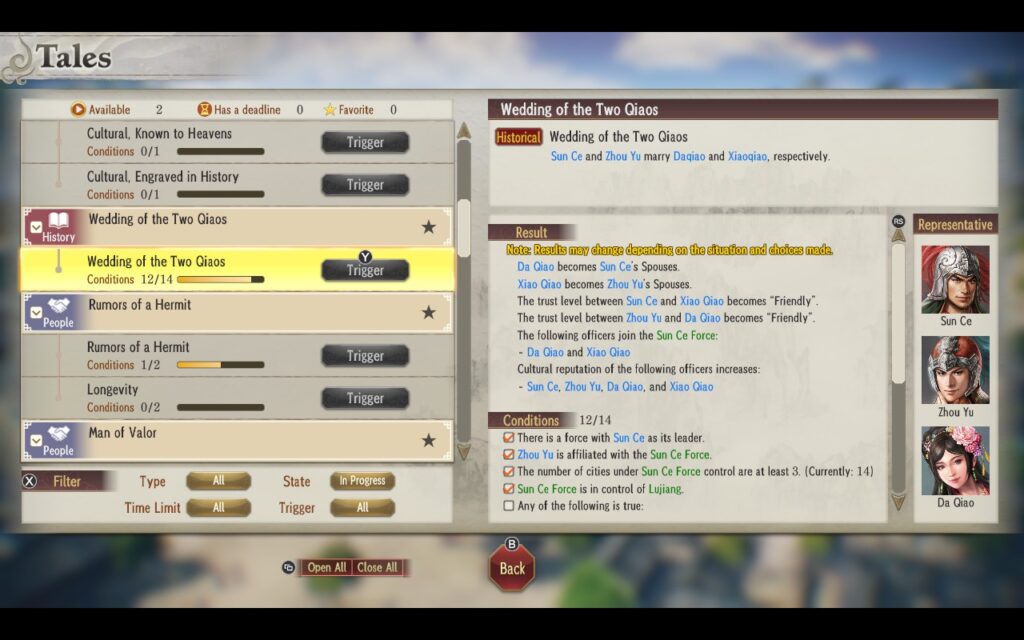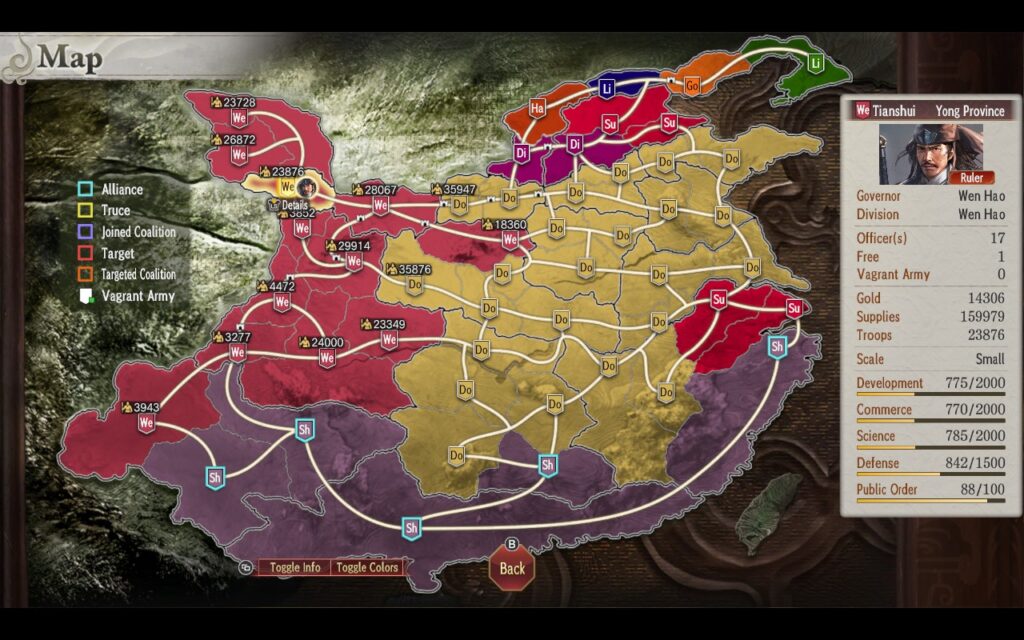Romance of the Three Kingdoms 8R
For decades now, the Romance of the Three Kingdoms series has been a gaming comfort food for me. Its more traditional, ruler-focused entries are relatively simple grand strategy games. Complexity comes from the vast supporting cast of history, with even the earliest games having hundreds of officers. Koei assigns various stats to officers based on what they did either in the novel or in historical documents (typically splitting the difference a bit where they disagree). This typically means that, like the Paradox grand strategy games, there is a massive set of playable options with varying degrees of difficulty. The player can either try and role-play or break the mold of history from the start.

In 2000, Koei released Romance of the Three Kingdoms VII. This was the first entry to allow playing as a subordinate (or free) officer, allowing you to influence things as a “bit player”, more like a Crusader Kings count under a duke. The RTK officer play entries involve take a more restrictive, but also more focused view than Crusader Kings – while intrigue can happen, it’s not as much the focus beyond officer rebellion/recruitment. As a subordinate officer, you receive monthly goals set by your governor. You can also play as an advisor, governor, or viceroy (commanding your own sub-force although still not able to do your own diplomacy). Romance of the Three Kingdoms VIII came out a year later, with more focus on inter-officer relationships (marriage and sworn siblings in particular). Although I personally favor VII of the two, VIII is one of the more popular entries in the series and thus got recently remade.
Gameplay in RTK8 Remake can get a little rote as a regular officer, but improves on the original. You can volunteer (or you’ll be volun-told) to perform a specific task – making the city safer, for example, which increases volunteer troop growth – and you’ll have a goal number to reach. This number may be harder or easier to reach depending on your character’s abilities and skills. Meet or exceed the goal and you’ll gain merit, getting closer to a higher rank (more pay and more troops in battles). As you go, you’ll also get the chance to meet other officers in your city, either through periodic events or intentionally. It’s to your benefit to befriend them as they’ll help you with your tasks occasionally. Even if you’re not particularly good at a task, a friend can help you get things done.
One new addition to RTK8R is a more robust event system (usually called Tales). Some of them are more focused stories with requirements and rewards (for example, townspeople ask you to take care of bandits, and depending on your proficiencies you can subdue or persuade them). Others are historical events or ending conditions. Unlike previous entries, the player chooses whether historical events occur (or even in some cases, which parts of them occur) if their requirements are met. This allows for a decent array of what-if scenarios, preventing a constant “rich-get-richer” that often occurred in the series for the main players in the novel/history. There are also additional fictional outcomes for several historical events (for example, the player as an officer can persuade their ruler to do things differently or prevent an assassination attempt).
Another new addition is that 8 Remake has several dozen additional officers (claiming to have 1,000 – and I believe it!). Among them are dozens of women from historical records, the novel and more recent fiction. In previous games many of them were either unlockable (e.g. the Qiaos / Lu Lingqi) or not present despite wielding considerable influence (Lady Wu, Sun Jian’s wife). It’s been fun to see names I don’t recognize and dig into the in-game biographies to learn more! 8 Remake also has an impressive number of scenarios – even if you prefer to join in at the early starting points, with less of the map occupied or fewer officers around, there are at least a half-dozen good places.

The previous officer-focused entries – at least the ones I’ve played (i.e. not 14) were never particularly difficult. RTK8R is no exception. Friendly AI is pretty bad, too. While different character personalities change behavior slightly (a Reckless personality, like Zhang Fei, will invade more eagerly), there seems to be some fundamental miscalculation going on. Sometimes I’ll see an AI invade the same province over and over, losing repeatedly. Other times I’ll see an uneasy peace, where neither side invades along a border despite terrible relations. And that’s just the strategic AI – the tactical AI makes poor decisions even in deployment, is easily lured away from key defense points, will waste precious Strategem uses on a single enemy unit even if they can reach more the same turn, and so on. It’s not uncommon for grand strategy games to simply add bonuses for the AI in “hard” modes, and RTK8R’s does exactly that. The result is usually that it simply takes longer for the player to win (and I’m no strategic genius).
To be fair to the AI, though, the map is also unintuitively set up. Each province typically has multiple connections to other provinces, but even if one is near another they may not have a connection. This often means that an attacker cannot bring reinforcements. The defender already has the advantages of defensive towers (frequently, but oddly not always), city defenses and in some provinces mighty gates that are difficult to bring down – so the result is usually a substantial defending advantage. The player can usually bring strong advantages of their own to bear, since the player often has multiple links (friendly / related officers). All of these links get bonuses for attacking near the player (and give the player corresponding offensive advantages).
Since you can only really lose in RTK8R if you are executed with no heir (can be a spouse, sworn sibling, or child – although I’ve never had my main character die), if your force is defeated and you are released, you can always bide your time, join another force, or join your former enemy and seek to start a revolt.
While the pitiful AI is a bit of a drawback, as a long-time fan of the series it’s hard not to like 8 Remake. While it’s not particularly groundbreaking, it gives a great deal of configurability in terms of scenarios, custom character creation, and even historical officer editing if you think Zhang Fei deserves a bit more INT. It’s a great story generator / sandbox game, and players can tweak their difficulty to their liking either via scenario/force selection or the built-in difficulty customization.